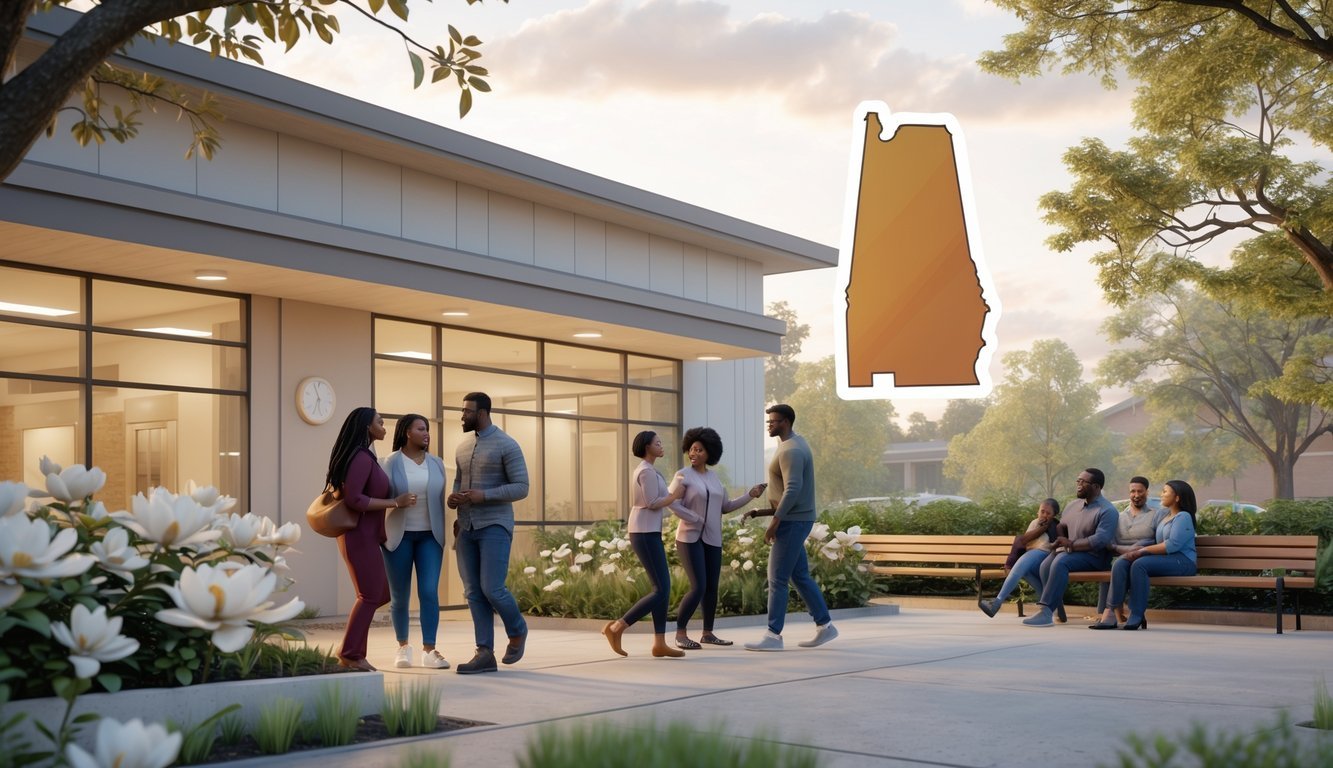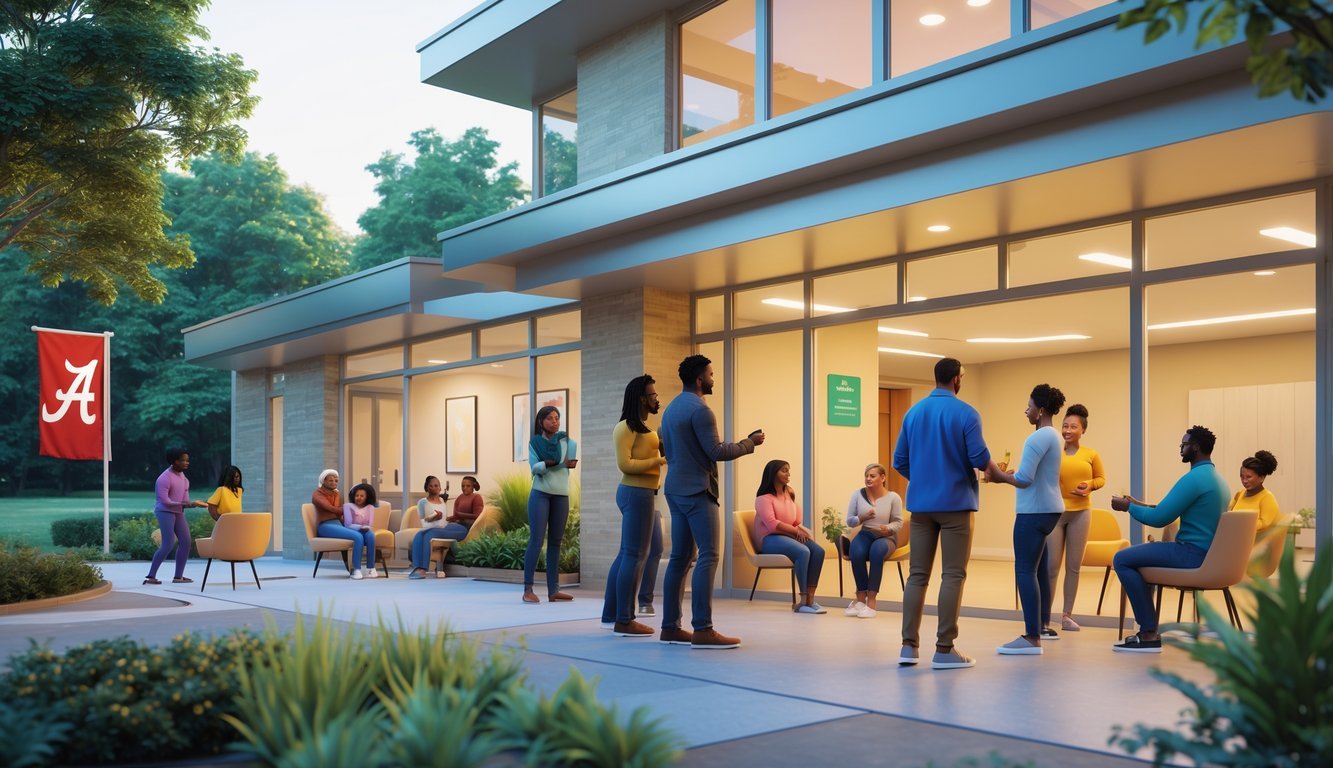PsychNewsDaily Publishers
100 Summit Drive
Burlington, MA, 01803
Telephone: (320) 349-2484
PsychNewsDaily Publishers
100 Summit Drive
Burlington, MA, 01803
Telephone: (320) 349-2484
Alabama provides accessible mental health support through community centers, state programs, and nonprofits, offering services regardless of financial status or insurance coverage.

Money shouldn’t keep anyone from getting mental health support. Alabama actually has a bunch of free mental health services through state programs, local centers, and nonprofits. These groups want to help you, no matter your financial situation.
Yes, free mental health services do exist in Alabama, and your eligibility usually depends on your income or insurance status. The state partners with 310 community mental health centers to offer outpatient care, crisis help, and even residential treatment all over Alabama.
If you’re struggling with depression, anxiety, substance use, or facing a crisis, you’ve got options. Alabama has everything from digital wellness tools and college counseling centers to crisis hotlines, so there’s more than one way to get support.

State agencies and community groups in Alabama run several free mental health programs. The Alabama Department of Mental Health manages many of these services, and you can reach crisis support through the 988 Suicide & Crisis Lifeline.
You might qualify for free mental health care if your income is low. Most programs use federal poverty guidelines to check if you’re eligible.
Income-Based Qualifications:
Many community health centers don’t require proof of immigration status. Some programs focus on people who are homeless or struggling with substance use.
The SOAR program helps adults experiencing homelessness who have mental illness get disability benefits. This program also supports people with substance use issues.
College students at state universities can usually get free counseling. The University of Alabama offers comprehensive counseling services to all enrolled students for free.
Alabama’s free mental health care covers both emergency help and ongoing treatment. Crisis services run 24/7 and you can reach them in several ways.
Crisis Services:
Ongoing Treatment Options:
Certified Community Behavioral Health Clinics offer full mental health and substance use treatment.
Community health centers provide integrated care. You can get mental health treatment along with your regular medical care.
Peer support programs let you connect with people who’ve been through similar struggles. Most counties have these free programs.
Transportation Issues
Rural areas don’t always have good public transit to mental health clinics. Mobile wellness services bring screenings right to local neighborhoods.
Ask about telehealth if travel is tough. Many providers now offer video sessions so you don’t have to leave home.
Long Wait Times
Demand is high, and that can mean waiting lists. Try calling more than one provider to see who can see you sooner.
Group therapy programs usually have shorter waits than individual counseling. It might be worth trying a group while you wait.
Stigma and Privacy Concerns
Some people worry about privacy, especially in small towns. Licensed providers have to follow strict privacy laws, no matter how you pay.
Online therapy can feel more private. Many platforms take Medicaid or offer sliding scale fees.
Lack of Awareness
A lot of folks just don’t know what’s out there. Your local health department can give you a list of nearby resources.
The Alabama Department of Mental Health website has up-to-date info on programs and who can use them.

State initiatives, advocacy groups, and community centers all provide mental health services in Alabama. The Alabama Department of Mental Health celebrates three years of 988 and runs crisis centers statewide.
The Alabama Department of Mental Health leads the way on mental health services. You can use the 988 Suicide & Crisis Lifeline by calling, texting, or chatting online.
Since 2022, crisis counselors have handled 132,713 contacts. They answer almost 88% of calls inside Alabama.
Crisis Response Services:
Local providers work with the department to connect you to ongoing care after a crisis. These crisis centers give you an alternative to the ER when you have a mental health emergency.
NAMI Alabama gives education, support, and advocacy for people with mental illness and their families. You’ll find NAMI chapters all over the state.
NAMI Services Include:
NAMI offers free Family-to-Family classes that teach coping skills. You can also go to In Our Own Voice presentations led by people who know what it’s like.
NAMI helps you find local resources and figure out the mental health system. Chapters meet regularly in communities around Alabama.
Alabama has several community mental health centers offering local services. AltaPointe is the only community mental health center in Alabama accredited by the Joint Commission.
These centers provide outpatient services close to home. You can get counseling, medication management, and help coordinating your care.
Services Available:
Community centers work with the 988 system for follow-up care. Many offer sliding scale fees based on your income.

Alabama’s mental health services cover individual counseling, group therapy, 24/7 crisis help through the 988 Suicide & Crisis Lifeline, and medication management at local mental health centers.
Free counseling is available at Alabama’s community mental health centers. You’ll find individual therapy, family counseling, and group sessions at these locations.
The University of Alabama Counseling Center offers full psychological services for students. Both undergrads and grad students can get help.
Therapy options include:
Most centers use proven treatments like cognitive behavioral therapy. Insurance isn’t required at many community mental health centers.
Support groups let you connect with others facing similar challenges. Trained peer specialists with lived experience often lead these groups.
You can find groups for depression, anxiety, bipolar disorder, and substance use. Many meet weekly and offer steady support.
Support group types:
Peer support programs pair you with someone who’s managed similar mental health issues. They give hope and real-world advice for recovery.
The 988 Suicide & Crisis Lifeline launched in Alabama on July 16, 2022 and offers 24/7 crisis support. Call or text 988 if you need immediate help.
Mobile crisis teams now respond to emergencies in many Alabama communities. These teams include mental health pros who can help on-site.
Crisis services include:
Crisis services are free and open to anyone in a mental health emergency. If you feel you’re in immediate danger, you can always go to the nearest ER.
Case managers help guide you through the mental health system and link you with services. They can schedule appointments, help you get benefits, and coordinate care.
Community mental health centers offer psychiatric medication management and regular medication reviews. You’ll work with psychiatrists or nurse practitioners to find what works for you.
Case management services:
Medication management means you’ll get regular check-ins to watch for side effects and adjust doses. If you can’t pay for prescriptions, many centers have assistance programs.
Alabama gives you a few ways to find free mental health services, including state apps, local networks, and county resources. You can get immediate help from digital platforms and helplines, or ongoing support from community groups.
The Connect Alabama Behavioral Health Services & Treatment Finder app helps you find mental health services nearby. This digital tool links you to resources and providers in your area.
For immediate support, you can text “HOME” to 741741 to reach the crisis text line. Phone support is at (334) 224-6920 or (334) 517-2216.
The Alabama Crisis System of Care gives you 24-hour access to emergency mental health help. This system connects you with someone who can help during a crisis.
United Way of Central Alabama connects people to mental health resources through their 211 helpline. Dial 2-1-1 from any phone and trained specialists will help you find what you need.
These folks can point you to free counseling, support groups, and treatment programs near you. They keep their lists and wait times updated.
Local churches, community centers, and nonprofits often team up with United Way to offer mental health support. You’ll find free support groups and peer counseling at many of these places.
County health departments throughout Alabama offer confidential mental health services. Each county sets up different programs depending on what their communities need and what funding they get.
Alabama works with 310 community mental health centers across the state. These centers provide outpatient counseling, day programs, residential services, and crisis intervention.
If you want to know what’s available where you live, just call your local county health department. A lot of counties use sliding fee scales based on your income, so you might pay less, or even nothing if you qualify.